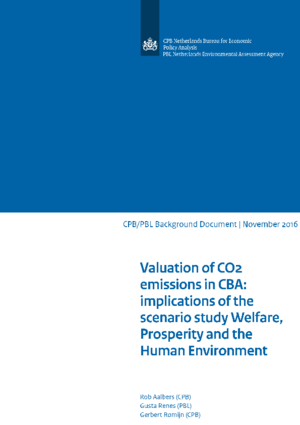Valuation of CO2 emissions in CBA: implications of the scenario study Welfare, Prosperity and the Human Environment
Under the High reference scenario, the world prospers and manages to agree on a low CO2 emission budget and is able to achieve large CO2 emission reductions. Under the Low reference scenario, far less CO2 emission reduction is achieved. In addition to these High and Low scenarios, other WLO scenarios comprise an analysis of what happens to CO2 emission reduction if the world manages to stay at or below a global temperature increase of two degrees Celsius. The way these scenarios have been constructed has implications for how the benefits of CO2 emission reductions are addressed and how they can be valued in cost-benefit analysis (CBA).
To achieve the European share of the required CO2 emission reduction, under each of the WLO climate scenarios, national and European climate policies have to be implemented. Within each scenario, climate policy is assumed to be as efficient as possible; the required emissions reduction is realised at the lowest possible cost to society, in a broad welfare economic sense. This involves a so-called efficient CO2 price. The assumption is that the implemented national and European climate policies all have a positive CBA balance, given the efficient CO2 price. The CO2 price is determined in such a way that the resulting CO2 emission reduction is exactly what is needed, under the scenario. This implies that, under the High reference scenario, more policy measures will be taken than under the Low scenario, but fewer than under the Two degrees scenario.
The WLO study only presents the prices set in the EU Emissions Trading System (EU ETS), but these do not reflect the price level at which a reduction in CO2 emissions becomes efficient. In this paper, we further examine the details of efficient CO2 prices. The information is intended for use in CBAs and may help determine what an efficient climate policy means for decisions taken by the Dutch Government. In this regard, this paper complements the WLO scenarios.
To determine a given measure’s CO2 benefits for use in CBAs, the efficient CO2 prices, listed in Table S1, provide the relevant valuation. The development of the efficient price shows, for the period between now and 2050, the CO2 prices required to achieve the cumulative CO2 reduction in a scenario at the lowest possible cost. When using these WLO scenarios, it is not necessary to take any possible waterbed effects into account, provided efficient prices are used.
The applicable CO2 prices and ways of dealing with the waterbed effect are important issues in determining the effects of climate measures. However, the manner in which CBAs for climate and energy policies should be drawn up is beyond the scope of this paper. The guidelines of the General Guidance for cost-benefit analyses (Romijn and Renes, 2013; Ministry of Finance, 2013) need to be worked out in a sector specific handbook for climate and energy policies.
In addition, the WLO climate scenarios have been drawn up on the basis of the current air quality policy, of which further tightening is conceivable. A stricter air quality policy often also reduces CO2 emissions, therefore leading to lower efficient CO2 prices. At the same time, this implies higher prices for emissions of NOx, SO2 and particulates. As a result, in CBAs for climate or energy policies where air quality is also important, sensitivity analyses need to make clear what the effects are of a stricter air quality policy.. This too is beyond the scope of this paper.

